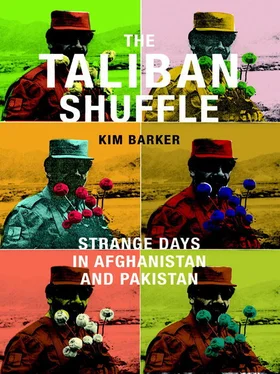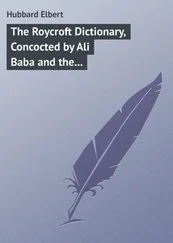“This is not good,” I said.
“No,” Farouq agreed. “This is a bad area. It’s known as the Bloody.”
“The Bloody?” I repeated. “It’s a mountain pass known as the Bloody? Seriously?”
Farouq nodded. “Not because of the Taliban. More because of thieves. Lots of robberies along this pass. It’s easy to hide and stop people. Even kill them. That’s why it’s called the Bloody.”
I was carrying $3,000 in cash, my computer, various equipment.
Farouq and Nasir argued. Then they announced their plan: They would pour water into the radiator—a move that had fixed one of our broken-down cars in the past. They would also dump oil in the oil pan. Other vehicles passed us, the men whiplashing when they saw me. I pulled my scarf up to cover my face and shrank into my seat, trying to hide in the middle of the Bloody.
“Not good, not good,” I told Farouq. “Call the police in Khost.”
“Kim. Calm down. Relax. I’m handling it.”
Farouq climbed out of the SUV with the satellite phone, looking for a signal. He reached a police official after calling several friends and asked the police to come help. “Right away,” the official said. Farouq then called Dr. Ali, our friend in Kabul, and asked him to start driving toward Khost to meet us.
We sat for half an hour. By coincidence, a police truck lumbered up the road. Farouq flagged it down and argued with the police to help us. Their answer—no. They were busy. He tried to call back the police official, who didn’t answer.
“They want money,” Farouq told us.
“They have foreigners trapped on a mountain pass called the Bloody, and they want a bribe,” I said, stating the obvious. Afghan AAA, after all. “Perfect. How much?”
“Fifty,” Farouq said. “And they’ll only tow us to the top of the mountain.”
“Of course. Fine.”
I could hardly blame the police—they made only about $60 to $100 a month, not enough to survive without corruption. The month before, one counter-narcotics cop had complained to me: “Our salary is too little. If you give a hundred bucks a month to a donkey, it will not fart.” So we gave the cops $50, and they tied a thick rope between their truck and our front bumper, looping it several times. The police truck strained with us, moving about ten miles an hour up the bumpy roads. Finally, after about ninety minutes, we made it to the top of the pass. The police untied us and waved. We waved back and started coasting down the other slope, fueled only by momentum, sailing around switchbacks and even passing the police truck at one point, Nasir laughing hysterically in the driver’s seat, avoiding tapping the brake. Finally, about half a mile after the road flattened out, we rolled to a stop. Nasir’s brother and Dr. Ali, in a tiny white car, pulled up in the opposite direction fifteen minutes later. Ali rolled down the window.
“Need a ride?”
That was logistics in Afghanistan—always figuring out a workaround, or anticipating the unexpected, which we should have expected. Most TV crews, aid agencies, and the UN traveled in convoys. Print journalists could never afford that. We gambled.
Back at the Kabul Lodge, sitting in front of my computer and writing about the dead elderly Afghan man, I wondered what my army engineer platoon would have thought about his death. Just one of the bad things that inevitably happened in war, I supposed. I often wondered what happened to those soldiers, and to Crowley, the intelligent smart aleck hoping to go back to graduate school.
I soon found out. Later that summer, the soldiers would tell another reporter that they felt I had betrayed them. After my story ran, Crowley and some of the other soldiers had been moved to a more dangerous base in Sharana, still in Paktika Province but near Kandahar, because of complaining that they had nothing to do in quiet Orgun-E. Crowley had also been busted to kitchen duty, frying up steaks for two weeks.
So that was my own collateral damage, my own unintended consequences. I was not happy that anyone got in trouble, but I soon forgot about it. Only years later would I find out what had happened to Crowley that August, almost three months after I met the platoon and he got married.
One evening in Sharana, Crowley was sent out on a last-minute mission. He was the gunner in the front vehicle, looking for land mines, for bags in the road, for suspicious cars, his eyes always scanning. But it was dusk—too dark to see much, too light for night-vision goggles. Then the explosion. His Humvee was blown up; a medic inside died. The other four men were injured. Crowley lost the lower part of his right leg. His new wife soon left him.
And that was Afghanistan, a country that lulled people into complacency, where hospitality was continually confused with support. When I finally found out what happened to Crowley, my heart hitting my kidneys during a random Google search, I would track him down, filled with guilt. If I hadn’t written the story, he wouldn’t have been moved. If he hadn’t have been moved, he wouldn’t have been blown up. Amazingly, he was gracious and kind. Luckily, he had remarried. He had also left the army and gone back to school. “I like to think of it as the best thing that ever happened to me,” he told me. “I don’t blame you.” But that would only make me feel worse.
CHAPTER 6
MARCH OF THE PIGS
Crouched on the dirty pavement, the fortune-teller studied my palm, shook his head, and started talking.
“What’s he saying?” I asked.
Dr. Ali, working with me because Farouq was busy with family obligations, shot me a look, somewhere between a smirk and sympathy.
“He says you will have a miserable life. Nothing will ever go right for you. You will always be unhappy. Do you want to hear more?”
“No,” I said. “I get it.”
I should have known this would be my fortune at the Kabul Zoo. Bored with all the obvious stories before the parliamentary elections in September 2005, I had made a bold move. I had gone to the zoo, planning to use it as an interesting way to tell the history of modern Afghanistan. My hook was Marjan the lion, donated by Germany in 1978, just as a coup by a Marxist party and Soviet sympathizers in the military sparked rumors of a Soviet invasion. Back then, in the zoo’s heyday, more than seven hundred animals lived there.
The next year, the Soviets indeed invaded, and Afghanistan became the major chip in the poker game between the Soviets and the West. The CIA, the Saudis, and Pakistani intelligence eventually decided to support the seven major Afghan jihadi parties, sending money and weapons, using Islam as a rallying tool. And by the end of the 1980s, the Soviets left, followed shortly by American pledges of help. The zoo languished.
An uncertain pall fell over the capital. The pro-Soviet government remained nominally in charge, but soon lost control of the countryside. The jihadi parties pushed toward Kabul, finally capturing the city in 1992. Their fragile warlord coalition held for only a short time. Warlords then took positions outside the city, shelling it while trying to kill and intimidate their rivals’ supporters. The Kabul Zoo was not immune—walls were knocked down or scarred with bullets. The zoo museum and the restaurant were rocketed.
Fighters from various factions, hungry for meat, soon realized the zoo had a ready supply. They kebabed the crane and the flamingo, roasting them over an open flame as zoo workers watched. They killed the two tigers for their pelts. One day a few fighters wanted to see how many bullets it took to kill an elephant. The answer: forty. Others stole the wooden fences from the zebra enclosure to feed fires. Animals died of starvation, of disease.
The bedlam inside the zoo mirrored what was happening in the city. Ask Afghans when the worst period of time was in Kabul, and they’ll never mention the Soviets or the Taliban. They’ll talk about this time, the civil war, when chaos and crazy ruled. They’ll talk about the warlords.
Читать дальше











